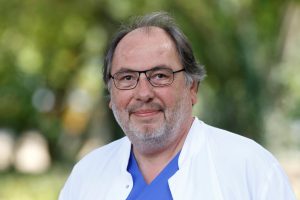Interview with Professor Rolf Schlösser, University Hospital Frakfurt, Germany
Question: What were the reasons for establishing the human milk bank at the University Hospital Frankfurt?

Photo: © Prof. Rolf Schlösser, University Hospital Frankfurt.
For a long time, our team has been working on how to improve the enteral nutrition of our preterm babies. With the very immature children, it is known that the intestine is not yet as well developed as with term born babies, especially with regard to motility. Meconium behavior and food intolerance often cause them to lack growth, prolonged duration of parenteral nutrition and, consequently, more frequent infections. A retrospective analysis of our preterm babies under 26 weeks gestation showed that we are still a long way from the ideal of optimal enteral nutrition and thus motivated us to seek solutions. One of these is certainly the diet with breast milk. Literature and our own observations show that human milk supplementation works better than cow‘s milk-based formula diet, but often mother’s own milk is not (or not yet) available in sufficient quantities. On the first day of life, preterm babies receive only their own mother’s colostrum, but it is often difficult to obtain. After that, there is usually a break, until enough own mother´s milk is available. Now we want to bridge this period with donor milk, because in comparison to formula-diet, breast milk has many positive effects, such as a lower frequency of necrotizing enterocolitis (NEC). On the other hand, negative psychological effects on the donors and the parents of the baby are currently being discussed.
Question: What were the obstacles and challenges of setting up the human milk bank at the University Hospital Frankfurt?
In Frankfurt, we decided to set up the human milk bank in cooperation with the Blood Transfusion Service (Blutspendedienst (BSD)). This institution, supported by the German Red Cross (DRK), is located in the immediate neighbourhood of the hospital, and the cooperation, especially between the neonatal unit and the BSD, has been outstanding for years. The correct and effective use of human material is a domain of every BSD in Germany, and also the logistical know-how should be used in order to track the transparent path of the donor milk from the donor to the recipient. On the other hand, cooperation between two major organisations, such as the University Hospital and the DRK‘s Blood Transfusion Service, requires the establishment and fulfillment of many regulations, which sometimes complicates work. In addition there is the clarification of responsibilities of the supervisory authorities.
Question: Which babies benefit from donor milk?
As donors, initially only women are selected who currently have their own children in the hospital and who have more than enough milk for them. Recipients are in the first place very preterm babies, who as described above should receive donor milk as a bridge. Since we also treat many children with intestinal malformation due to a large children’s surgery department in our hospital, these patients form the second important group.
In addition, we noticed that the mothers of preterm babies could provide their children with their own breast milk in a relatively short time. It is possible that the human milk bank is helping mothers to get their milk production started faster for their own child.
Question: What kind of suggestions and recommendations would you give hospitals who are interested in opening a human milk bank?
Long-established human milk banks in Germany and abroad have shown suitable ways to establish and organise a human milk bank. There are also guidelines and recommendations that show important aspects that need to be fulfilled. Of course you will have to adapt such guidelines for your own hospital. The route chosen in Frankfurt is still fairly new, at least in Germany.
Professor Schlösser is the Vice president of the German Society of Perinatal Medicine (DGPM) and supports EFCNI in a pre-course within this year´s DGPM congress on 27 November in Berlin, Germany. The pre-course will deal with the setup and organisation of human milk banks. It is carried out within the EFCNI Academy and is open for registrations (view more http://bit.ly/2Lb7vlj).

